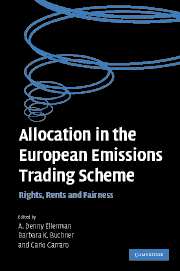Book contents
- Frontmatter
- Contents
- List of figures
- List of boxes
- List of tables
- List of contributors
- Introductory note/Foreword
- Acknowledgements
- Glossary and abbreviations
- Part I The EU ETS allocation process
- Part II Experiences from Member States in allocating allowances
- Part III Concluding remarks and background material
- 13 Unifying themes
- Appendix I Participants
- Appendix II The individual country outlines
- Appendix III The country tables
- Appendix IV Background material from the European Commission
- Index
13 - Unifying themes
Published online by Cambridge University Press: 22 September 2009
- Frontmatter
- Contents
- List of figures
- List of boxes
- List of tables
- List of contributors
- Introductory note/Foreword
- Acknowledgements
- Glossary and abbreviations
- Part I The EU ETS allocation process
- Part II Experiences from Member States in allocating allowances
- Part III Concluding remarks and background material
- 13 Unifying themes
- Appendix I Participants
- Appendix II The individual country outlines
- Appendix III The country tables
- Appendix IV Background material from the European Commission
- Index
Summary
The preceding chapters describe and analyse the NAP process in ten representative Member States of the European Union. It is now time to pull together the unifying themes that emerge from these individual accounts. In this final chapter, the editors discuss the lessons that emerge from this experience and make some concluding comments on what seem to be more general principles informing the allocation process and on what are the global implications of the EU ETS. As any reader will have noticed, the diversity of experience among the Member States is considerable, so that it must be understood that these lessons and unifying themes are drawn from the experience of most of the Member States, not necessarily from all. For every lesson and each general principle, there is typically at least one Member State for which it does not apply, or it does so only weakly. Accordingly, as is true of all lessons and concluding comments, these will need to be applied carefully and some may not apply to future allocations in the EU ETS or to the circumstances surrounding future allocations of CO2 rights by other countries. Still, it seems likely that most of the problems experienced by the Member States of the European Union will be encountered by others who follow this example and that the lessons and general principles drawn from them will be helpful.
These lessons and unifying observations are grouped in three categories: those concerning the conditions encountered, the processes employed and the actual choices.
Information
- Type
- Chapter
- Information
- Allocation in the European Emissions Trading SchemeRights, Rents and Fairness, pp. 339 - 369Publisher: Cambridge University PressPrint publication year: 2007
Accessibility standard: Unknown
Why this information is here
This section outlines the accessibility features of this content - including support for screen readers, full keyboard navigation and high-contrast display options. This may not be relevant for you.Accessibility Information
- 8
- Cited by
